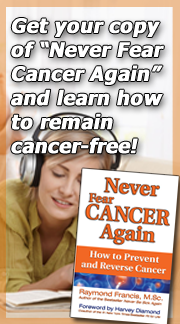Nov 3rd 2025
Toxins and Cancer
 . . . detoxification is no longer optional
“Reducing Environmental Cancer Risk,” a report made by the President’s Cancer Panel (PCP) in 2010, estimated that almost half of all Americans will get cancer at some point during their lives. Over the age of 50, 40% of men now develop prostate cancer, while 40% of women develop breast cancer.
These are pretty alarming statistics. But you don’t have to be a statistic. Contrary to
. . . detoxification is no longer optional
“Reducing Environmental Cancer Risk,” a report made by the President’s Cancer Panel (PCP) in 2010, estimated that almost half of all Americans will get cancer at some point during their lives. Over the age of 50, 40% of men now develop prostate cancer, while 40% of women develop breast cancer.
These are pretty alarming statistics. But you don’t have to be a statistic. Contrary to popular belief, the knowledge necessary to prevent this devastating disease already exists. You can learn all about it in my book, Never Fear Cancer Again. But today I want to focus on why taking specific measures to detoxify your body are no longer optional but necessary if you want to insure that you remain cancer-free for life.
The human body has never before in history been subjected to the onslaught of toxins that assails us daily. In the 19th century, cancer was a rare disease, affecting 0.1% of the population. Today virtually every man, woman and child in the US is in toxic overload, and this is a primary reason cancer rates have soared.
As stated by the PCP report: “With nearly 80,000 chemicals on the market in the US, many of which are used by millions of Americans in their daily lives, and are un- or understudied and largely unregulated, exposure to potential environmental carcinogens is widespread. . . The American people—even before they are born—are bombarded continually with myriad combinations of these dangerous exposures. ”
Although public policy changes can and should be made with regard to how new chemicals are approved, right now, it is up to us as individuals to protect ourselves by learning how to both avoid toxins where possible and support our body’s natural detoxification capabilities.
popular belief, the knowledge necessary to prevent this devastating disease already exists. You can learn all about it in my book, Never Fear Cancer Again. But today I want to focus on why taking specific measures to detoxify your body are no longer optional but necessary if you want to insure that you remain cancer-free for life.
The human body has never before in history been subjected to the onslaught of toxins that assails us daily. In the 19th century, cancer was a rare disease, affecting 0.1% of the population. Today virtually every man, woman and child in the US is in toxic overload, and this is a primary reason cancer rates have soared.
As stated by the PCP report: “With nearly 80,000 chemicals on the market in the US, many of which are used by millions of Americans in their daily lives, and are un- or understudied and largely unregulated, exposure to potential environmental carcinogens is widespread. . . The American people—even before they are born—are bombarded continually with myriad combinations of these dangerous exposures. ”
Although public policy changes can and should be made with regard to how new chemicals are approved, right now, it is up to us as individuals to protect ourselves by learning how to both avoid toxins where possible and support our body’s natural detoxification capabilities.
 Fuel your life with the purest vitamins
Fuel your life with the purest vitamins